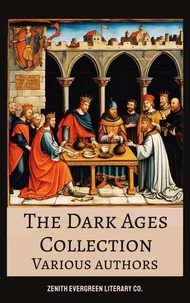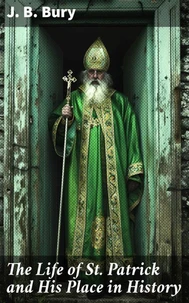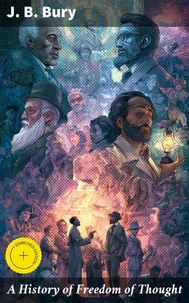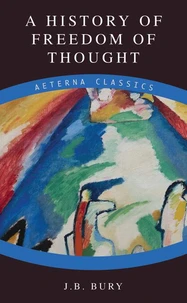A History of Freedom of Thought
Par :Formats :
Disponible dans votre compte client Decitre ou Furet du Nord dès validation de votre commande. Le format ePub est :
- Compatible avec une lecture sur My Vivlio (smartphone, tablette, ordinateur)
- Compatible avec une lecture sur liseuses Vivlio
- Pour les liseuses autres que Vivlio, vous devez utiliser le logiciel Adobe Digital Edition. Non compatible avec la lecture sur les liseuses Kindle, Remarkable et Sony
 , qui est-ce ?
, qui est-ce ?Notre partenaire de plateforme de lecture numérique où vous retrouverez l'ensemble de vos ebooks gratuitement
Pour en savoir plus sur nos ebooks, consultez notre aide en ligne ici
- Nombre de pages141
- FormatePub
- ISBN859-65--4725188-0
- EAN8596547251880
- Date de parution04/09/2022
- Protection num.Digital Watermarking
- Taille369 Ko
- Infos supplémentairesepub
- ÉditeurDIGICAT
Résumé
In "A History of Freedom of Thought, " J. B. Bury meticulously explores the evolution of intellectual liberty from ancient to contemporary times, detailing its philosophical underpinnings and societal implications. Bury's prose is both erudite and accessible, presenting a comprehensive narrative that deftly interweaves historical events with the progression of ideas. The book is situated within the broader discourse on the importance of freedom of thought as a cornerstone of modern democratic societies, unearthing how various epochs have shaped and been shaped by this fundamental concept.
J. B. Bury, a distinguished historian and philosopher, was deeply influenced by the intellectual currents of the late 19th and early 20th centuries. His rigorous academic background, coupled with his advocacy for rationalism and secularism, informed his analysis of freedom's historical trajectory. Bury's commitment to understanding the interplay between thought and society is evident in his inquiry into the obstacles and triumphs faced by thinkers throughout history, offering invaluable insights into the struggles for intellectual independence.
Readers are encouraged to engage with this profound work, as it not only illuminates the past but also provokes critical reflection on the present state of freedom of thought. Bury's synthesis of history and philosophy serves as an essential guide for scholars, students, and anyone interested in the ongoing quest for intellectual autonomy in a world often fraught with dogma.
J. B. Bury, a distinguished historian and philosopher, was deeply influenced by the intellectual currents of the late 19th and early 20th centuries. His rigorous academic background, coupled with his advocacy for rationalism and secularism, informed his analysis of freedom's historical trajectory. Bury's commitment to understanding the interplay between thought and society is evident in his inquiry into the obstacles and triumphs faced by thinkers throughout history, offering invaluable insights into the struggles for intellectual independence.
Readers are encouraged to engage with this profound work, as it not only illuminates the past but also provokes critical reflection on the present state of freedom of thought. Bury's synthesis of history and philosophy serves as an essential guide for scholars, students, and anyone interested in the ongoing quest for intellectual autonomy in a world often fraught with dogma.
In "A History of Freedom of Thought, " J. B. Bury meticulously explores the evolution of intellectual liberty from ancient to contemporary times, detailing its philosophical underpinnings and societal implications. Bury's prose is both erudite and accessible, presenting a comprehensive narrative that deftly interweaves historical events with the progression of ideas. The book is situated within the broader discourse on the importance of freedom of thought as a cornerstone of modern democratic societies, unearthing how various epochs have shaped and been shaped by this fundamental concept.
J. B. Bury, a distinguished historian and philosopher, was deeply influenced by the intellectual currents of the late 19th and early 20th centuries. His rigorous academic background, coupled with his advocacy for rationalism and secularism, informed his analysis of freedom's historical trajectory. Bury's commitment to understanding the interplay between thought and society is evident in his inquiry into the obstacles and triumphs faced by thinkers throughout history, offering invaluable insights into the struggles for intellectual independence.
Readers are encouraged to engage with this profound work, as it not only illuminates the past but also provokes critical reflection on the present state of freedom of thought. Bury's synthesis of history and philosophy serves as an essential guide for scholars, students, and anyone interested in the ongoing quest for intellectual autonomy in a world often fraught with dogma.
J. B. Bury, a distinguished historian and philosopher, was deeply influenced by the intellectual currents of the late 19th and early 20th centuries. His rigorous academic background, coupled with his advocacy for rationalism and secularism, informed his analysis of freedom's historical trajectory. Bury's commitment to understanding the interplay between thought and society is evident in his inquiry into the obstacles and triumphs faced by thinkers throughout history, offering invaluable insights into the struggles for intellectual independence.
Readers are encouraged to engage with this profound work, as it not only illuminates the past but also provokes critical reflection on the present state of freedom of thought. Bury's synthesis of history and philosophy serves as an essential guide for scholars, students, and anyone interested in the ongoing quest for intellectual autonomy in a world often fraught with dogma.











